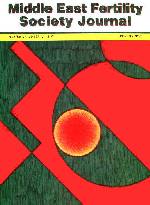
|
Middle East Fertility Society Journal
Middle East Fertility Society
ISSN: 1110-5690
Vol. 9, Num. 2, 2004, pp. 171-172
|
Middle East Fertility Society Journal, Vol. 9, No. 2, 2004, pp. 171-172
CASE
REPORT
A
healthy baby from a cooled incubator
T.
M. Aktan, M.D.*,H.
Görkemli, M.D.†,S.
Duman, M.D. *
Departments
of Histology and Embryology, and Obstetrics and Gyneacology, Meram Faculty of
Medicine, SelcukUniversity, Konya, Turkey
* Department of Histology and Embryology, Meram Faculty of Medicine,
SelcukUniversity, Konya, Turkey
† Department of Obstetrics and Gyneacology, Meram Faculty
of Medicine, SelcukUniversity, Konya, Turkey
Corresponding Address: Dr. Huseyin Gorkemli, Alavardi Mah. Sivasli Ali Kemal
Cad., Maverde Sitesi 23/3, 42080 Meram-KonyaTurkey, Tel.: +90 532 4112119,
Fax: +90 332 3239930, E-mail: hgorkemli@hotmail.com
Received on January 21, 2004;
revised and accepted on April 26, 2004
Code Number: mf04029
INTRODUCTION
Assisted reproduction covers two major steps, which are necessary for a successful
infertility treatment. The first step is the controlled ovarian hyperstimulation
(COH) and the second, which is based on laboratory procedures, and begins from
oocyte retrieval and ends with embryo transfer in uterine cavity. However just
one break in a chain is enough to split the whole procedure. Unfortunately,
during the long way of AR treatment there can be a lot of expected and unexpected
threats.
A couple suffering from infertility for 19 years applied to our Assisted Reproduction
(AR) Unit. They were evaluated and accepted for an ICSI cycle in our unit.
During our routine embryology laboratory procedure of culturing, an unexpected
event has occurred. It was possible to cancel the cycle but we continued the
treatment and the embryo transfer was done, implantation was achieved and a
healthy male baby was born.
We faced an unexpected failure in our incubator due to a problem in the electricity
circuits of the online power supplier. The embryos were exposed to stay in
a relatively cooled incubator. Although we had this negative condition, we
transferred the embryo due to the strong desire and the approval of the couple.
CASE REPORT
A couple (female: 39, male: 41) applied to our unit, with a deep social stress
factor especially on the female part, which made her to be in a strong desire
for a baby. Routine examinations were done and all evaluations addressed to
a healthy male and female, so the couple was accepted for ICSI treatment with
the diagnosis of unexplained infertility.
Standard long ovulation induction protocol was preferred for the COH. Lucrine
daily 0.1cc. (Abbot, USA), Gonal-F 75IU (Serono, Switzerland), Pregnyl 5000
IU (Organon, Holland) used for medication. After ICSI procedure (day 0, during
02:00 p.m.) 8 oocytes were placed as two oocytes in per 20 microliter medium
(IVF-20, VitroLife, Scandinavia) pool under oil at Nunc culture dish, and left
for overnight incubation (6.0% CO2, 99.5% humidity, 37.0o C).
After 19 hour pronucleus check, the oocytes were placed in G.1.2 (VitroLife,Scandinavia).
Unfortunately, about 11:00 p.m. (on the 36th hours) in the second night, a
problem occurred in our electricity line and no one was aware of the situation
till 08:30 a.m. (on approximately the 46th hours). At this moment the inside
temperature of the incubator (WTB Binder, CB 150, Germany) was recorded as
29.4o C (a standard temperature placed inside the incubator for
checking) and the CO2 was measured by Fyrite as 4.3%. The power
line was fixed at 09:10 a.m. and we microscopically observed two embryos at
two cell stage. Only one four-cell stage embryo was observed in our second
microscopic examination at 04:30 p.m. The couple was called in the late afternoon
for discussion. The situation was explained and they were informed that there
were not any recorded medical documents on the safety of such an embryo. We
advised the couple to cease the process. They asked for a private conversation
about the situation with each other and at the end of discussion, they declared
that whatever the risk was; as they were the owners of the embryo, they wanted
it to be transferred. We obeyed their decision and at 10:30 p.m. (on the 60th
hours) one single embryo at 4-cell stage was transferred successfully.
RESULT
Biochemical and clinical markers confirmed the implantation and the gestation.
During the antenatal control of the pregnancy, everything was normal. A healthy
male baby (51 cm and 3150 gr) was born by caesarian section at the 38th week
of gestation. There was not any sign of morphological, neurological and clinical
abnormality; the baby is still healthy at his 18 months of age.
DISCUSSION
In this situation the problem was out of the knowledge of the couple and it
was easy to say to the couple that no embryos were developed so there would
be no embryo transfer and the case file could be closed. As the ART team, we
discussed the situation and concluded that we were not the owner of the embryos,
in fact, the owner was the couple. So we decided that the correct decision
could be made by the owner of the embryo. They insisted to take any risk if
existed. Since the woman was in a deep desire to achieve a pregnancy, she played
a major role for giving the final decision.
It is accepted that keeping the temperature at 37o C is extremely
important for a proper mammalian cell culture system. 37o C is also
essential to maintain a stabile pH for the culture media. Mammalian cell mitosis
is very sensitive to temperature changes because 37.0o C is critical
for the polymerization of microtubules that are essential for cell mitosis
(1). However in our experience we observed a healthy baby from a healthy pregnancy
although there was an evident temperature fall in the incubator during the
culturing. So it is possible to perform some new researches on the temperature
changes and its effect on the mammalian cell culture.
REFERENCE
Alberts B, Dennis B, Lewis J,
Raff M, Roberts K, Watson J.D, Molecular Biology of the Cell. New York: Garland
Publishing, 1996:804-805.
© Copyright 2004 - Middle East Fertility Society
|
